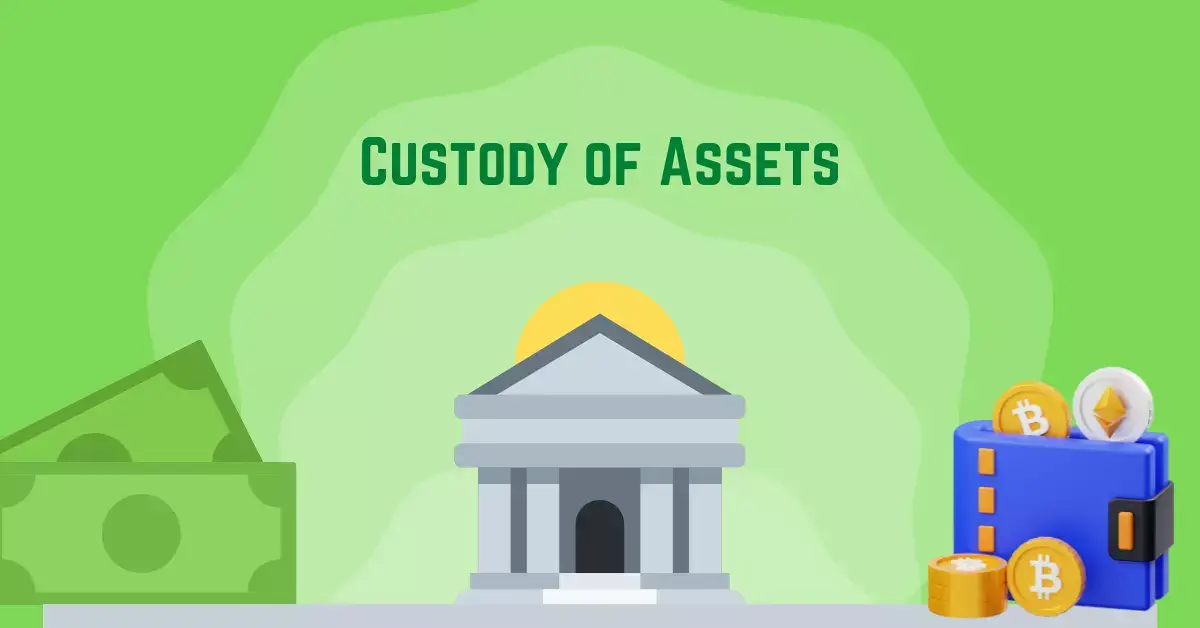Custody Of Assets: What Does It Mean and Why Does It Matter?
If you’re going to invest your money then security should be at the top of your priorities list. Learn why the custody of assets is so important.

If you’re going to store your money somewhere — or invest it — then security should be at the top of your priorities list. To achieve this, few things are more integral than the custody of assets. For anyone still in the dark about exactly what this concept means and how it works in practice, we have all the answers.
Ah, custody of assets — it’s a concept that’s deceptively simple yet endlessly complex at the same time. In its purest form, custody means that an entity holds assets for safekeeping, thereby protecting them from theft or loss. But it’s not always so straightforward.
Companies use different policies and methods to secure their clients’ assets, all with varying levels of complexity. The chosen processes will partly depend on the types of assets and institutions in question (traditional bank vs online lender, for example, and crypto vs fiat currency).
Confused already? Keep reading and we’ll try to shine some light on what custody of assets is and why ignoring it could put your assets at risk.
Defining custody of assets
Before we go into the finer details, let’s start with a simple definition: custody of assets means a third-party looks after assets on behalf of another. Although you might think your assets belong to you, once you deposit them with an institution, you’ve effectively transferred ownership to someone else (either the institution itself or a third party).
But what does this look like in practice?
In the context of peer-to-peer lending, for example, a custodial entity can help collect interest from borrowers, re-invest that interest into other loans, and protect collateral. This helps protect customers from potential problems (more on this later).
Before we go any further, it’s useful to clarify a few key terms in the world of custody: escrow payments and non-custody assets.
Escrow payments
Escrow payments involve a third party holding money for two other parties while they complete a transaction.
This is a more limited function — it’s only performed temporarily for a single purpose, whereas custody of assets is a continuous process involving a wider range of functions (not just holding money).
Non-custody assets
Now that’s cleared up, let’s delve into a related definition: non-custody assets. This should be easy enough to grasp if you’ve understood everything so far! Basically, non-custody assets are anything that isn’t held by a custodian of some kind.
Cash falls into this category since it’s stored in the pockets of individuals and not held by a financial institution like a bank — and so do cryptocurrencies when we store them in our own private crypto wallets.
What is a legal custodian?
Hold on, we’re not quite done yet — there’s one additional term to discuss, and that’s legal custodians. In this context, we can define a legal custodian as the entity that holds custody of an asset.
But here’s where things get interesting — just because you deposited your assets with one institution, it doesn’t necessarily mean that the institution is the custodian.
For instance, many crypto and traditional exchanges use accredited custodians as partners. They act as intermediaries and look after certain deposits. Thanks to their insurance policies and compliance with regulations, funds entrusted to them receive an extra level of protection. Here is a good place to introduce depositories and distinguish them from custodians.
What is the difference between a Depository vs a Custodian?
Depositories have extra control, ownership, and liability over assets and securities in addition to accepting deposits. Every deposit must be returned in the same condition that it was received.
An instance of a depository is a bank. It keeps the client’s money with the obligation of returning it later.
The fact that banks have access to a wider range of asset classes and more discretion over how to manage their money is a significant drawback. Simply put, banks have the ability to gamble with your funds by investing them or giving them to someone else as a home or business loan. In return, they usually pay the Beneficiary a tiny interest, usually less than 1% per year.
Does this ring a bell to you? Yep, many crypto exchanges and crypto lenders have done the same and collapsed with billions of users' funds in the process. Unfortunately, the examples are becoming more and more, but some of the most painful were FTX, Celsius, BlockFi, and others.
Broker-dealers are also a type of a Depository. Broker-dealers are eligible for keeping securities for a client's account. If they give back the securities in the same condition in which they were received, they may lend them to 3rd parties.
Can we trust the custodians?
The Securities and Exchange Commission (SEC) regulates custodians. Depending on their degree of registration, they may additionally be subject to regulation by the Treasury and/or Finance Departments of the Federal and State Governments.
The regulation demands that custodians act as fiduciaries for their clients, which implies that they must act in the beneficiaries best interests at all times.
Advantages and issues with custody of assets
Let’s start with the positives. Custody of assets isn’t just some fancy feature that sounds good but offers minimal practical benefits — it’s something that protects your assets from risks of theft and loss. In other words, pretty important stuff!
Without a third-party custodian handling assets, the “custody” belongs to the company you are dealing with directly. Namely, if you lend money using a peer-to-peer platform and there’s no custodian, there would be no mitigating party involved in the transaction and the platform carries all the risks.
A third-party custodian would help to spread the risk and be a neutral holder of your assets.
Which option sounds the most secure to you?
Another significant benefit is that many custodians guarantee the safety of your assets. Assets held in legal custodians are often protected by a multi-million insurance policy.
This is a huge perk, especially in the loosely regulated cryptocurrency world, where regulations aren’t yet fully refined and assets aren’t yet protected by the same deposit guarantees as “standard” checking or high-yield accounts with banks.
Potential problems
But we want to be impartial here — there are a few potential issues with giving custody of your assets to a third party.
Because custodians are regulated and bound to follow certain rules, they may have to carry out processes that can result in delays in payments or the release of assets.
While we understand these delays can be annoying for you, the benefits of added security do outweigh the inconvenience.
Want to Keep Reading?
- Regulatory Permissions Could Threaten Crypto Decentralization
- Australia: Here is What you Need to Know About the Coming Crypto Regulation
- Offshore Crypto Wallet: What the Crypto-Rich Know That You Don't!
- Top 7 Best Crypto Podcasts In 2023
- Cryptocurrency (Everything You SHOULD Know)
Want to know how you can support Crypto Fireside?
Sign up below. It's free, it's easy, and it allows you to comment and join the discussion 🔥
